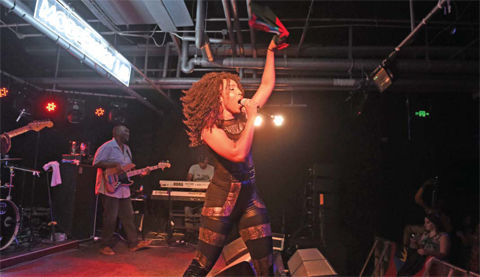 This photo shows singer Tizzy, from Antigua and Barbuda, performing during the Latin American and Caribbean music festival in Beijing. — AP photos
This photo shows singer Tizzy, from Antigua and Barbuda, performing during the Latin American and Caribbean music festival in Beijing. — AP photos
Gyrating in the night, Trinidadian soca singer Lil Bitts's derriere, hugged by a pair of hot pants, is center stage in efforts to bring together China and the Caribbean as Beijing seeks a more prominent presence in Washington's back yard. "I want to teach people how to jump and wave and wind and enjoy yourself like a Caribbean person," she told AFP at Beijing's biggest Latin American and Caribbean Music Festival to date.
The four-day event, which saw bands from 15 Caribbean countries looking to twerk open pocketbooks and hearts in the world's second-largest economy, is part of the exchanges agreed when Chinese President Xi Jinping attended a 2014 summit in Brasilia. China's growing economic and political interests on the US doorstep are part of its "efforts to deepen trade, investment and financial ties to developing countries and regions and at the same time to further broaden 'South-South' cooperation", said Matt Ferchen, professor of international relations at Tsinghua University. But efforts to reinforce those links at a "people-to-people" level have to contend with a clash of cultures from opposite sides of the globe-sometimes bordering on racism.
Lil Bitts's Chinese translator Li Quyi, 19, said the crowd had been lively only because there were few Chinese in attendance. "The Chinese are too stiff and serious-they aren't willing to move around. They would've all been crushed." Outside the venue, Deng Yuanhe, a migrant construction worker, crept over to a metal fence to catch a glimpse of the first black people he had ever seen. He liked the music, he said, but admitted: "If they came over to talk to me or approached me in the night, I'd definitely be afraid. So black, with such big eyes."
'The next 100 years'
One of the biggest projects with Chinese involvement in the Caribbean is the ill-fated $3.5 billion Baha Mar resort complex in the Bahamas, described as the biggest commercial real estate development in the western hemisphere. It has yet to be completed, while its owner has filed for bankruptcy and has sued the Chinese contractor, blaming it for multiple delays. Ratings agency Standard and Poor's has downgraded the Bahamas' credit rating in response. But Paul Gomez, the Bahamas' ambassador to Beijing, insisted that "the Chinese are not viewed negatively" as a result. Chinese companies are involved in an estimated $250 million development of Pointe Nassau, building condominiums and performing arts centers in the heart of the capital, and have snatched up the historic British Colonial Hilton Hotel.
The former British colony, although just a short flight from the United States, was turning to Chinese capital as other countries had "their own situations and austerity programs", Gomez told AFP. "China is looking to expand, because it has a significant population and has always been a forward-planning type of nation-not just for the next year or the next 20, but for the next 100 years."
'Think about balance'
Other than oil and fish, the Caribbean has few of the natural resources that have driven much Chinese investment in the past, but a Beijing-based businessmen said it had other attractions. Unlike in Africa, it was easy to get money out, he said, and it also offered a foothold in the Americas that could avoid tariffs in other markets on the continent, such as Brazil. "When I speak to the ambassadors, I get the sense that they especially hope within this term of office to bring in some Chinese investment, because China now has the money." But mega-projects such as Baha Mar risked being too high profile, added the businessman, who did not want to be identified because he works with governments.
"When you do something on such a large scale right on the US's doorstep, then that has an impact, it becomes an issue between countries," he said. "That's no longer business, that's politics. America has to think about balance." Another obstacle, Ferchen of Tsinghua University said, was that Beijing does not have diplomatic ties with several Caribbean countries. Instead they number among self-governing Taiwan's 22 remaining political allies-although one of them, Panama, sent a hip-hop artist to take part in the Beijing festival.
Such considerations were far from the minds of some in the audience at the event. "I didn't even know there were countries in the Caribbean," said Liu Yudi, 23, an English language masters student cowering wide-eyed against a wall as she watched a group of Bahamian fans grinding enthusiastically. "When we think of the Americas, we only think of the US and Canada. The other countries below are a bit hazier."-AFP




